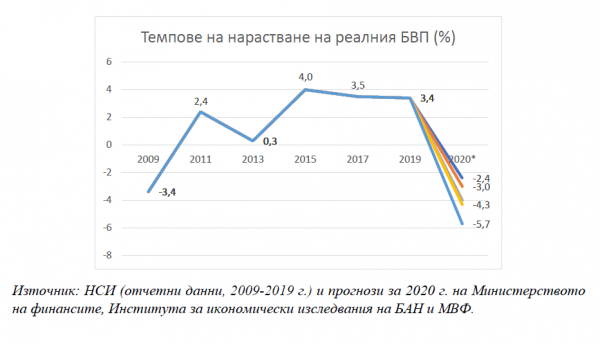22.04.2020
Researchers from the Economics Department at FEBA, Sofia University prepared an analysis of the economics effects related to the coronavirus crisis.
The analysis was prepared by:
- Prof. Dr. Stephan Petranov, Head of the Economics Department;
- Assoc. Prof. Dr. Dimitar Zlatinov, Scientific Secretary of the Economics Department and Vice-Dean of the Faculty of Economics and Business Administration;
- Assist. Prof. Dr. Milen Velushev;
- Assist. Vassil Karaivanov
Analysis Summary
The Bulgarian economy is entering an economic crisis, the depth and duration of which may prove to be significant. Although a certain slowdown in economic growth was expected, given last year’s prospects for development of the European and global economy, the current crisis is of a completely different nature – it is the result of the global pandemic caused by COVID-19.
The current crisis is different from the usual declines in economic activity, and there are at least two reasons for that. On the one hand, the crisis is not the result of internal imbalances in the economy but is caused by factors external to the economy. On the other hand, the crisis affects acutely both the supply and demand for goods and services in the country.
The economic consequences of this crisis will affect all segments of the Bulgarian society, which will probably go through it in three phases:
- Limiting of distribution and strong restrictions on social and economic activities;
- Fighting the virus by the use of proven vaccines and / or drugs and gradual relaxation of restrictions;
- Preparing for the future.
The crisis has been making a direct impact on both the real sector and the financial sector of the economy and will change the macroeconomic environment in which the Bulgarian economy operates. The complex of economic factors and consequences and especially the uncertainty about the duration of the pandemic are making the exact economic effect on the Bulgarian economy difficult to predict. At this stage, there are different assessments depending on the scenarios for the development of the infection:
- decline in the real gross domestic product in 2020 between 2.4% and 5.7%;
- rise of unemployment to levels between 6.2% and 12% of the workforce;
- rate of price increase (inflation) - between 0% and 8%.
The economic consequences of the crisis require appropriate economic measures. The total value of the measures taken by the government and the expected measures has been estimated at about 6-7% of GDP. This is possible as a result of the macro-financial stability in recent years, the presence of a solid fiscal reserve and the good credit rating of the country. The limit for issuing government debt voted by the National Assembly provides additional opportunities, so that if necessary, state support can reach 10-15% of the GDP. However, such measures cannot be unlimited, due to the specifics of the currency board system (currency board), because of which in Bulgaria, unlike most other countries, the function of the Bulgarian National Bank as a lender of last resort is severely limited. In this context, Bulgaria’s accelerated application for accession to EU’s Exchange Rate Mechanism II (ERM II) should be considered as a very positive step.
